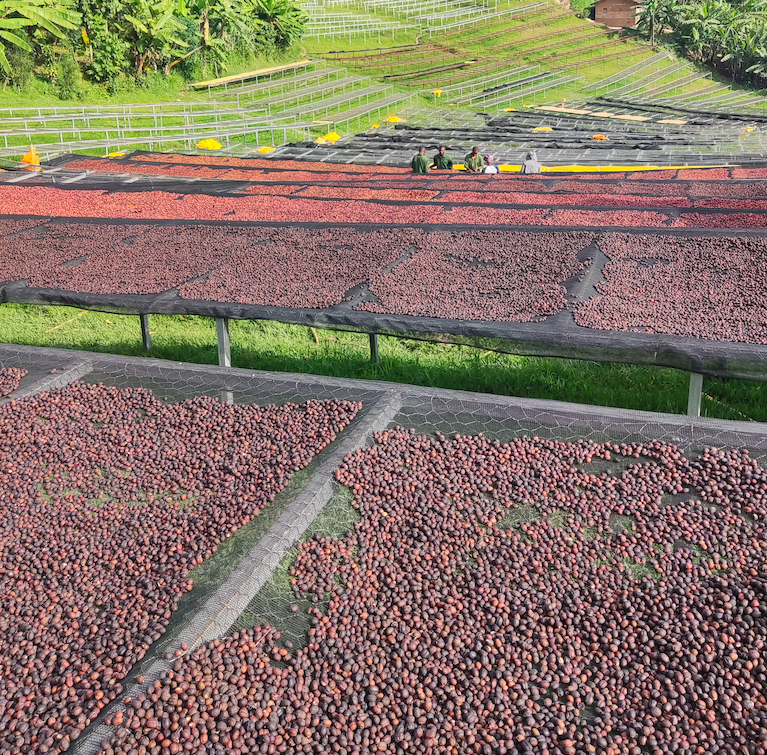Kenya is our Origin Focus in Issue 51, on shelves now. Go get yours! This is an extra anecdote on what was observed on this trip. Read the full story in Issue 51.
Words by Katie Burnett
On a recent buying trip to Kenya, the goal was to select coffees to roast and share with customers. Something quickly became clear: the vast majority of the coffee on the tables were washed process coffees, except for 2 cups which were natural. Which begged the question, why were 99.9% of the cups on the table washed processing?
Let's take a step back and get an understanding of washed vs natural coffee processing. When a coffee is naturally processed, the cherries are picked from the trees and then dried on drying beds, cherries on. Naturally processed coffees are typically bolder, more complex and more “fermenty” in their flavour when compared to washed coffee. Contrastingly, washed coffees will have their cherry as well as mucilage (sugary mucus around the seeds) stripped from the bean through washing, before they are dried.
Although it might appear that a naturally processed coffee is “easier” to process, because the washing step is omitted, there are some complications and complexities that can be difficult for producers to cater to.
By drying the coffee with the cherry still attached, the cherry will begin to ferment and soften (the cell structure breaks down, like an ageing piece of fruit) around the coffee bean within. Simply, these fermenty, sweet fruit flavours then penetrate the beans and impose their flavour on the coffee. It can result in delicious and complex coffees.
The even, controlled and safe drying process requires a large amount of space (the coffees need to be equally distributed across drying beds) and extended periods of time in open air and sunshine. And for logical reasons, washed coffees dry/reach the correct moisture level faster.
So the climate and especially rainfall has a huge impact on this process. For example, in Rwanda the rainy season which brings heavy and persistent rain lasts from March to May, which coincides with the country’s largest coffee harvest months in March to June. Because of these restrictions, it was believed that naturally processed coffee would damage Rwanda’s reputation for high quality coffee. It was believed that naturally processed coffees were inferior. Export of naturally processed coffees was banned by the government in the early 2000's, but a producer-led movement to lift this ban was successful in 2011 and Naturals again began to feature. Many Central African countries have the same climate and challenges, and the even fermentation and drying of the coffee can be difficult to achieve.

Natural Processing in action in Rwanda on raised drying beds.
When we visited a wash station in the Kirinyaga region in Kenya, we parked our car next to a plastic tarp with coffee cherries drying on it. We were confused about why there was coffee being ‘processed’ in the driveway and asked our hosts, the managers of the wash station, what it was. We received the nonchalant response of, “It’s Mbuni”. He perceived our looks of confusion and explained a bit further. Every harvest there are a few cherries that are lower quality for a variety of reasons, either damaged by insects, heavy rain or hadn’t ripened properly, these coffees are collected and dried, essentially as naturals, in whatever space is available at the wash station. In this case, in the parking lot. This, historically, has been the only use of natural processing in Kenya and speaks to the perceived lower quality that natural processing produces. This grade is MH/ML: "Mbuni Heavy" or "Mbuni Light" and sold for well-below market value to the buyers of the lowest grade coffees. However, there are some farms in Kenya who have embraced natural processing and we were privileged enough to taste a few of them while in Kenya such as one from Ruera Coffee in Kiambu County.
As Stephen Vick of Spring Valley Coffee in Kenya states, "Quality Kenyan coffees, at this time, are all washed. As the supply sector developed in Kenya, there was a clear incentive for farmers to produce washed coffees. Especially after the introduction of the Coffee C trading structure in 1963, naturals were earning less and less on the international market, so farmers were discouraged from producing them in many countries. In Kenya, mbuni (naturals) have always been treated as second-rate, made up mostly of under- and over- ripe and otherwise inferior coffees stripped from the trees after harvest. Obviously, without quality cherries to begin with, the results are pretty dismal. There are some farmers who are beginning to experiment with quality naturals, especially at the request of buyers who are interested in this flavour profile, but production levels are still quite low as farmers are hesitant to risk producing something that may not have a market. In the next 10 years, however, I think we will see more and more quality naturals produced in Kenya."
The reputation of naturally processed coffees has been changing in Central Africa, led by increased demand in the market. The demand for brighter, bolder and more complex coffees has grown since the early 2000s, particularly in the specialty coffee sectors. Leading to increased demand for naturals as a result.
Since the early 2000s, the reputation and quality of natural processing in Africa has come a long way. However, in Kenya in 2025 we only tasted 4 naturals out of 400 total samples. But there is a definite feeling that natural processing in Kenya is only just beginning to blossom and will become fruitful for producers in the near future.